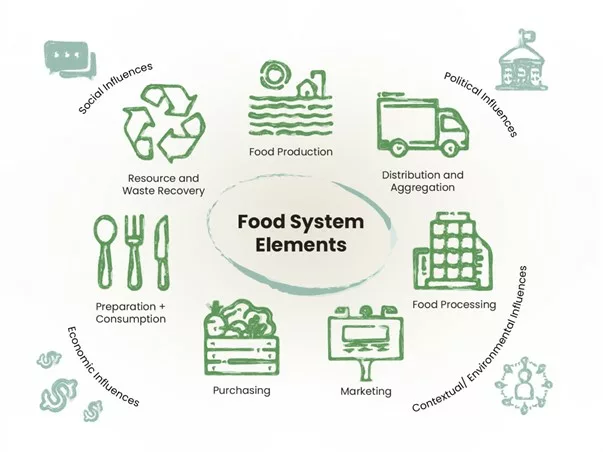
What Are Food Systems and Why Are They Important?
By Sarah Wiemert, Planner II
The Healthy Food Action Plan focuses on uplifting and expanding aspects of the St. Petersburg food system that residents identified as priority initiatives during the community engagement phase of the Plan. A food system is an integral part of communities. But what exactly is a food system, and how does it influence whether a community is thriving?
Food Systems 101
A food system is a collection of physical processes and abstract ideas that interact with people, communities, and the environment in different ways to create, use, and dispose of food products. It is best represented as a circle or web with many connected parts and can vary in complexity depending on the size and location of the system. Food systems are usually defined as local, regional, or global, and every community participates in at least one type of food system. A simplified diagram of a food system is represented below.

Courtesy of the North Carolina Local Food Council.
Food Systems Aspects
Each industry or organization might include slightly different terms for each element of their food system depending on their priorities or available resources. Regardless, all food systems involve people and systems interacting with the categories below.
Assets
Assets can include ideas like equity, policy, education, geography, and the economy. These are meant to contribute to and enhance the physical processes in food systems. The communities that create and carry out assets are the ones that decide if they are beneficial or need improvement. Assets may be formal or informal, grassroots or bureaucratically led, and adaptive to the needs of people and communities over time. Measuring which assets exist in a food system and how they function can sometimes be difficult and require participation from the communities that utilize them.
Sectors
Sectors include physical processes like agriculture, value added processing and manufacturing, shipping or trucking, and waste recovery and disposal. These processes are at the heart of food production and may take place in a single geographic area or across communities and over time. Sectors influence and are representative of the economies bound to local, regional, and global food systems.
Society
Society considers which values, ideas, and level of participation related to the assets and sectors in food systems are important. People and workers responsible for carrying out assets and sectors connect each aspect of a food system in complex and nuanced ways. Which processes and ideas are connected within a particular food system may influence how healthy communities function.
How do food systems affect health equity?
Health and nutrition are inherently tied to food systems. The quality and cost of the foods that are available or a person’s ability to locate, get to, and afford food is influenced by all aspects of food systems. This is called “access” and contributes to health outcomes like instances of diet related diseases in a community.
Which food system a person participates in, or the geographic area where they live, is one of the biggest factors contributing to their individual health outcomes even when accounting for other factors like income or access to health care. Groups of people will experience similar health outcomes because of social status, food policies, and availability and access to quality foods supporting nutrition. This concept is part of the idea known as the “social determinants of health” and varies greatly across race, income, and physical locations. The relationship between a community’s social determinants of health and their food system is two-way.
Public health outcomes are an important indicator of how food access and public policy support low income and disadvantaged communities, who are the most likely group to suffer from poor nutrition status due to the social determinants of health.
For more information on food systems and their effects on public health, visit Johns Hopkins Center for a Liveable Future.
Join us at a Community Food Forum!
Share your ideas, vision, and voice as we work together toward a healthy and equitable St. Pete. Free & Open to the Public! Childcare provided for ages 5 and up.
December 11 at 6:30 p.m.
Enoch D. Davis Center, 1111 18th Ave. S
December 13 at 5:00 p.m.
Virtual – Link: https://zoom.us/j/92566662231
January 9, 2024, at 6 p.m.
Campbell Park Recreation Center, 601 14th St. S




